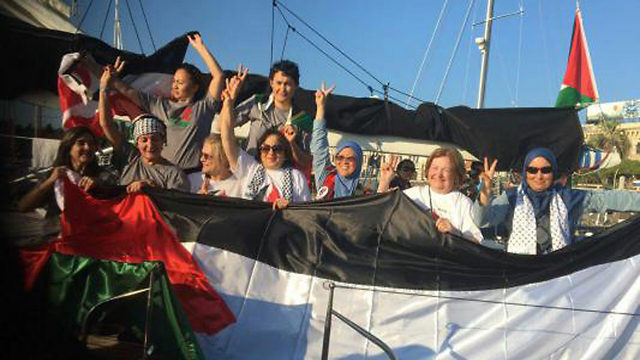Op-ed: The women’s boat to Gaza is another unpleasant and inconvenient reminder that we cannot keep talking about tunnels and rockets as if that’s the entire deal while starving a population and preventing a way out of the strip.
It’s been called a flotilla, but even someone like me with no knowledge whatsoever on naval affairs understands that it’s not the Sixth Fleet. Just a small yacht travelling in the sea for a month on its way to Gaza. A nutshell with 13 women on it, as well as an al-Jazeera reporter who did her best to add a dramatic dimension to the event. “The women are prepared for any scenario,” she said to the cameras, which caught two-three women on the deck behind her, enjoying the warm Middle Eastern sun.
In other words, this entire flotilla is nothing but another cap that has been fired as part of the war run by different groups in the world—from fanatic Islam to secular left—against the Israeli blockade of the Gaza Strip. It’s not something that really threatens the Israeli rule and the balance of power, even in light of the rocket fired at Sderot on Wednesday.

They will not bring any medicine to Gaza, explained one of the commentators on television in a tired tone of voice. What was not said is that the women knew that. They knew it so well, that they did not even bother to load a single box on the yacht for visibility purposes. Neither a box of medicines nor a sack of rice or a chest of toys for children: just a camera and a microphone in their war over a minute or two at the beginning of the news edition, over half a page in the newspaper, over the hope that their message will resonate in places where decisions are made.
In other words, it’s not the flotilla, my friends, it’s Gaza. And Gaza is a strip choked between the Israeli border and the Egyptian border, without any way out through air or by sea, depending on its enemies’ mercy. How much water it will receive, how much electricity will flow, how much flour and how many matchboxes. If they want, they will give. If they don’t want, they will not give.
Israel can soon, if it wants, celebrate a decade since the beginning of the siege, which was declared immediately after Hamas rose to power in legitimate elections. But the Gazans have no cause for celebration. Their unemployment rate is among the highest in the world (yes, it’s higher in Zimbabwe); six in 10 young people don’t work; the average daily wage is around NIS 60 (roughly $16); and even if some 800 trucks a day bring goods from Israel to the strip, the Gazans have no money to buy anything. One third of the family income is used to purchase water. And although the strip’s residents use about 70 liters a day per capita (one third of the average daily consumption in Israel), international experts believe that within three years there will be no drinkable water there.
On Wednesday, the Israeli Navy took control of the Zaytouna-Oliva yacht, which was towed to Ashdod, and the women on it were taken to the shore and have likely already been transferred to Ben-Gurion Airport to get the hell out of here. But one thing is clear: The message, even if it doesn’t make it through its five minutes of fame in the media, will remain long after they are gone, against decision makers’ interests.
And the message is that Gaza, whether we like it or not, is not a place that will die quietly; that Israel will not be able to forever silence the voices coming both from the east and west at the cheap price of a quick and professional commando operation; that it’s not enough to load 13 or 14 or 15—no one’s counting and no one cares—semi-delusional and exhausting women on a bus and buy them a one-way ticket to remove the Gaza nuisance from our table.
Such a flotilla is another reminder, an unpleasant and inconvenient one, that we cannot keep talking about tunnels and Qassam rockets as if that’s the entire deal, while starving a population and preventing it from leaving the strip through the sea or through the air.
“One day thousands of Gazans, women and children, will storm the fence,” Gideon Bromberg, the Israeli director of EcoPeace Middle East, an Israeli-Palestinian-Jordanian organization which combined environmental aspects with the battle for peace, said about a year ago. And he, how should I put it, has not been on any Zaytouna.
As reported by Ynetnews
